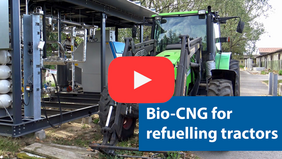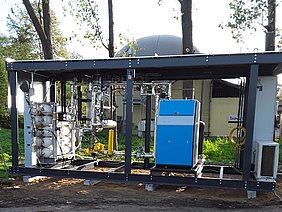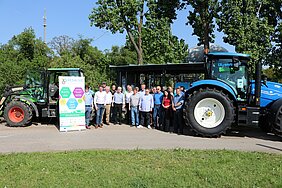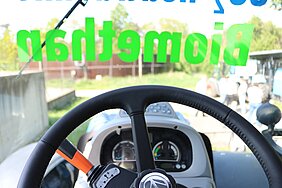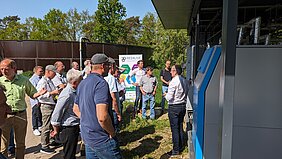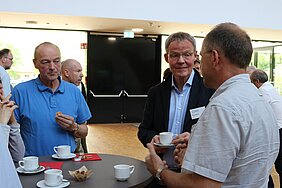The upgrading of farm biogas to biomethane/bio-CNG offers great bioeconomic potential to replace fossil fuels such as diesel or natural gas in agriculture. As part of the EU project RES4LIVE (Energy Smart Livestock Farming towards Zero Fossil Fuel Consumption), a pilot plant for upgrading biogas to biomethane/CNG and for refuelling series tractors with methane engine has been designed for the first time. It can be used decentralised and self-sufficiently on a farm. With sustainably produced biogas from the farm's own organic residues manure, the fuel supply becomes independent and greenhouse gas emissions can be significantly reduced. This achievement is now listed as an excellent key innovation on the European Commission's Innovation Radar Platform.
The bio-CNG pilot plant is the result of intensive research collaboration as part of the RES4LIVE project, which aims to make animal husbandry at various European locations energy self-sufficient and fossil-free. The plant was built on the site of the agricultural project partner Lehr- und Versuchsanstalt für Tierzucht und Tierhaltung e.V. in Groß Kreutz and processes the farm's own biogas into biomethane/bio-CNG, thus enabling a complete replacement of fossil fuels for mobile drives in agriculture.
The innovative complete system was made commercially available for the first time in the 10-35 Nm3 size in a joint development with the machine and plant manufacturer BioG GmbH. This was achieved through innovative simplification steps such as 2-in-1 hybrid compression, single-stage hollow fibre membrane treatment and an open frame design with greatly reduced hazardous areas. Permanent operation of the refuelling station and the farm tractor converted to gas operation is planned beyond the project life time as part of the Leibniz Innovation Farm for Sustainable Bioeconomy (InnoHof) for commercial, teaching and demonstration purposes. <o:p></o:p>
"We are delighted that one of our innovations has been analysed by the European Commission's Innovation Radar and recognised as an important step towards the defossilisation of agriculture," said Prof. Thomas Amon, WP Leader and project manager at the Leibniz Institute for Agricultural Engineering and Bioeconomy (ATB), one of the 17 RES4LIVE project partners.
The Bio-CNG plant was categorised as "Tech Ready" - i.e. technically mature and ready for use. The potential for creating a new market was also rated as "high".
The RES4LIVE project shows that the utilisation of biogas in agriculture is not only economically viable, but also environmentally friendly. By integrating bio-CNG technologies, agricultural businesses can not only reduce their energy costs in the long term, but also make an important contribution to climate protection.
"The practical use of biogas produced on the farm from manure and organic residues as a fuel shows that animal husbandry and agriculture can be managed environmentally friendly to save the climate," said Detlef May, Managing Director and operator of the plant at LVAT.
As part of the project, a workshop was held at the Leibniz Institute for Agricultural Engineering and Bioeconomy (ATB) in Potsdam on 30 April 2024, which provided a comprehensive insight into the economic and technical aspects of BioCNG filling stations. Finally, the participants had the opportunity to visit the pilot plant for upgrading biogas to biomethane/CNG and for refuelling methane-powered tractors at LVAT in Groß Kreutz, as well as to see methane-powered tractors in action, including a series tractor converted from diesel to CNG. The engine was converted by the RES4LIVE partner CRMT.
The speakers from industry, consulting and research presented their experiences and findings on topics such as the certification of bio-methane as a sustainable fuel, the requirements for company-owned CNG refuelling stations and the potential of bio-CNG refuelling stations in the agricultural sector.
The Bio-CNG plant will be listed on the European Commission's Innovation Radar Platform and will therefore be available to interested groups.
Contact:
Prof. Dr. Thomas Amon
Head of Department Sensors and Modelling
Phone: +49 331 5699-510
E-Mail: tamon@atb-potsdam.de
Detlef May
Lehr- und Versuchsanstalt für Tierzucht und Tierhaltung e.V. (LVAT)
Phone: +49 33207 32252
E-Mail: LVATGrossKreutz@web.de
Dr. Ulrike Glaubitz
Press and Public Relatoins
Phone: +49 331 5699-820
E-Mail: presse@atb-potsdam.de
The Leibniz Institute for Agricultural Engineering and Bioeconomy (ATB) is a pioneer and driver of bioeconomy research. We create scientific foundations for the transformation of agricultural, food, industrial and energy systems into a comprehensive bio-based circular economy. We develop and integrate technology, processes and management strategies in the sense of converging technologies in order to intelligently network highly diverse bioeconomic production systems and to control them in a knowledge-based, adaptive and largely automated manner. We conduct research in dialogue with society - motivated by knowledge and inspired by application. www.atb-potsdam.de
The Lehr- und Versuchsanstalt für Tierzucht und Tierhaltung e.V. (LVAT) is a practising agricultural enterprise as a non-profit, registered association. LVAT cultivates around 900 hectares in the Potsdam-Mittelmark district for its own fodder production and as a basis for various research projects. As a farm specialising in animal breeding and animal husbandry, LVAT keeps various livestock (dairy cattle, suckler cows, fattening bulls, pigs, sheep, goats). The company regularly tests innovations, has long-standing cooperative relationships with research institutions and is experienced in carrying out on-farm trials. The LVAT and the ATB are linked by a particularly close, long-standing collaboration, which has entered a new dimension since 2021 with the Leibniz Innovation Farm for Sustainable Bioeconomy (InnoHof).

